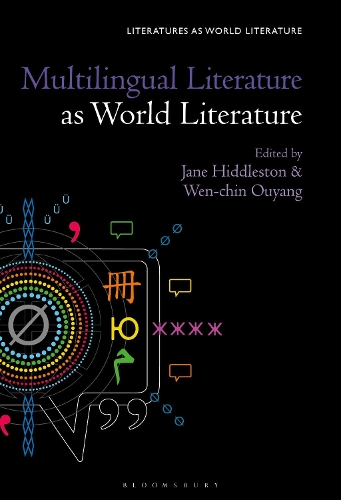
Multilingual Literature as World Literature
(Hardback)
Available Formats
Publishing Details
Multilingual Literature as World Literature
By (Author) Dr Jane Hiddleston
Edited by Dr. Wen-chin Ouyang
Bloomsbury Publishing PLC
Bloomsbury Academic USA
29th July 2021
United States
Classifications
Tertiary Education
Non Fiction
Literary theory
809
Physical Properties
Hardback
328
Width 152mm, Height 229mm
608g
Description
Multilingual Literature as World Literature examines and adjusts current theories and practices of world literature, particularly the conceptions of world, global and local, reflecting on the ways that multilingualism opens up the borders of language, nation and genre, and makes visible different modes of circulation across languages, nations, media and cultures. The contributors to Multilingual Literature as World Literature examine four major areas of critical research. First, by looking at how engaging with multilingualism as a mode of reading makes visible the multiple pathways of circulation, including as aesthetics or poetics emerging in the literary world when languages come into contact with each other. Second, by exploring how politics and ethics contribute to shaping multilingual texts at a particular time and place, with a focus on the local as a site for the interrogation of global concerns and a call for diversity. Third, by engaging with translation and untranslatability in order to consider the ways in which ideas and concepts elude capture in one language but must be read comparatively across multiple languages. And finally, by proposing a new vision for linguistic creativity beyond the binary structure of monolingualism versus multilingualism.
Reviews
This wide-ranging collection makes a bracing intervention both in translation studies and in current debates over world literature. Moving beyond the common emphasis in both fields on a movement of texts from one language to another, Hiddleston and Ouyang and their contributors construe multilingualism as a fundamental feature of world literature, and of literatures worldliness. From its trenchant introduction through its illuminating case studies, Multilingual Literature as World Literature exemplifies the border-crossing fluidity it celebrates. * David Damrosch, Ernest Bernbaum Professor and Chair of Comparative Literature, Harvard University, USA *
Viewing world literature not as books in circulation but, importantly, as writing that emerges in the world's swirl of tongues, Hiddleston and Ouyangs volume demonstrates the urgency and rich rewards of reading literature outside the strictures of monolingualism. * Stefan Helgesson, Professor of English Literary Studies, Stockholm University, Sweden, and co-author of Literature and the World (2020; with Mads Rosendahl Thomsen) *
The remarkably rich chapters in this book foreground linguistic plurality as the key framework for approaching world literature. The emphases on creativity, imbrication and heterogeneity that ensue constitute a robustly disruptive challenge notably to the monolingualism, linguistic indifference, Anglonormativity and myths of effortless translatability on which too many previous studies of this literary phenomenon have variously relied. The result is a volume that will become an essential point of reference for all serious scholars in the field of world literature. Here is compelling evidence of creative multilingualism in action. * Charles Forsdick, James Barrow Professor of French, University of Liverpool, UK *
Author Bio
Jane Hiddleston is Professor of Literatures in French at the University of Oxford, UK. Her previous books include Writing After Postcolonialism: Francophone North African Literature in Transition (Bloomsbury, 2017), Understanding Postcolonialism (2009) and Postructuralism and Postcoloniality (2010). Wen-chin Ouyang is Professor of Arabic and Comparative Literature at SOAS, University of London, UK. She is the author of Politics of Nostalgia in the Arabic Novel (2013), Poetics of Love in the Arabic Novel (2012) and Literary Criticism in Medieval Arabic-Islamic Culture: The Making of a Tradition (1997).
